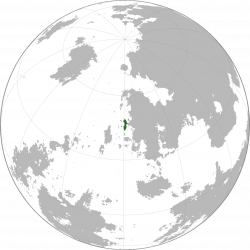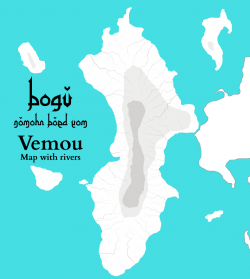Difference between revisions of "Archive:Vemou"
| Line 119: | Line 119: | ||
'''Vemou''' (IPA: /'vɛ.moʊ/, [[Vemou (language)|Vemou]]: Vemó, IPA: /'ve.moː/), officially the '''Free Association of Vemou''', is a country located on the island of [[Vemou (island)|Vemou]] and surrounding islands. It is separated to the east from northern [[Aeyakaimia]] and mainland [[Miraria]] by the [[Rude Strait]], and shares sea borders with Aeyakaimia to the south. | '''Vemou''' (IPA: /'vɛ.moʊ/, [[Vemou (language)|Vemou]]: Vemó, IPA: /'ve.moː/), officially the '''Free Association of Vemou''', is a country located on the island of [[Vemou (island)|Vemou]] and surrounding islands. It is separated to the east from northern [[Aeyakaimia]] and mainland [[Miraria]] by the [[Rude Strait]], and shares sea borders with Aeyakaimia to the south. | ||
==Etymology== | <!-- ==Etymology== | ||
The name '''Vemou''' comes partially from the Ancient Methinat spoken by the Mettat Empire in ancient times. The Ancient Methinat name was "wêtis-udənstám", meaning "Willow Island", named for either the island's widespread ''Salix atrocinerea'' plants or the alpine ''Salix lanata''. This name died out but influenced later names for the region: Ancient Methinat "wêtis-udənstám" was later borrowed into Proto-Vemou as "*wetì-uttàm". The first element of this was adapted into the extinct Middle Laefevian name for the region, "Vetmu", a combination of Proto-Vemou ''*wetì'' and a second element, probably related to Middle Laefevian "mut", meaning "hill". "Vetmu" was eventually borrowed into Old Vemou as "Bemó", which developed into the modern '''Vemó''' and was anglicised as '''Vemou'''. | The name '''Vemou''' comes partially from the Ancient Methinat spoken by the Mettat Empire in ancient times. The Ancient Methinat name was "wêtis-udənstám", meaning "Willow Island", named for either the island's widespread ''Salix atrocinerea'' plants or the alpine ''Salix lanata''. This name died out but influenced later names for the region: Ancient Methinat "wêtis-udənstám" was later borrowed into Proto-Vemou as "*wetì-uttàm". The first element of this was adapted into the extinct Middle Laefevian name for the region, "Vetmu", a combination of Proto-Vemou ''*wetì'' and a second element, probably related to Middle Laefevian "mut", meaning "hill". "Vetmu" was eventually borrowed into Old Vemou as "Bemó", which developed into the modern '''Vemó''' and was anglicised as '''Vemou'''. --!> | ||
==History== | ==History== | ||
Revision as of 07:58, 24 April 2017
| The Free Association of Vemou Vú méudarre darrese Vemó di |
||||
|---|---|---|---|---|
|
||||
| Motto: Méus ercé. Together, we flourish. |
||||
| Anthem: Áfe ví vétes di The Song of the Willows |
||||
Location of Vemou on Sahar
|
||||
Map of Vemou with major cities
|
||||
| Capital | Vetelou | |||
| Largest | Fersai | |||
| Official languages | Vemou | |||
| Recognised regional languages | Ammaric | |||
| Government | Free association | |||
| Establishment | ||||
| - | Independence from Mettat; establishment of the Vemou Republic | 1957 | ||
| - | Breakup of the Vemou Republic; establishment of the Free Association | 2014 | ||
| Area | ||||
| - | Total | 100,198 km2 38,687 sq mi |
||
| Population | ||||
| - | 2015 census | 10,929,091 | ||
| - | Density | 109.1/km2 282.6/sq mi |
||
| GDP (nominal) | 2015 estimate | |||
| - | Total | $209.565 billion | ||
| - | Per capita | $19,175 | ||
| Gini (2015) | 0 low |
|||
| HDI (2015) | 0.862 very high |
|||
| Currency | Écau (VCR) | |||
| Time zone | WST (SCT-1) | |||
| Drives on the | left | |||
| Internet TLD | .vm | |||
Vemou (IPA: /'vɛ.moʊ/, Vemou: Vemó, IPA: /'ve.moː/), officially the Free Association of Vemou, is a country located on the island of Vemou and surrounding islands. It is separated to the east from northern Aeyakaimia and mainland Miraria by the Rude Strait, and shares sea borders with Aeyakaimia to the south.
Music
Vemou has a very rich musical history. There are many forms of traditional folk music one can find throughout Vemou's history. Many forms of Vemou folk use the %INSTRUMENT%, a small ten-string composite chordophone, similar to the harp lute, albeit smaller and without a fretboard. In addition, much of traditional Vemou folk music is dependent on one of two pentatonic scales: the %X% scale (1, b3, 4, 6, b7) and the %Y% scale (1, 2, 4, b6, b7).
Sport
The most popular sport in Vemou is football.


